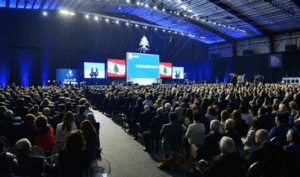
The Lebanese Diaspora: A Journey of Struggle, Identity, and the Future of Citizenship
For generations, Lebanon has witnessed waves of emigration, driven by political oppression, economic hardship, and social injustice. Many regions, particularly the North, were at the heart of early migration, as their populations suffered under the muqata’jiya system, where feudal lords imposed excessive taxes and tributes, making survival unbearable for ordinary people.
The events of 1869 further fueled migration, as many sought security and prosperity abroad. This mass movement peaked after the establishment of the Mutasarrifate and continued until World War I, creating a diaspora founded on injustice, survival, and the pursuit of opportunity.
The Lebanese Diaspora: A Homeland Abroad
Wherever the first Lebanese immigrants settled, their relatives followed, forming miniature versions of Lebanon in foreign lands. Entire villages disappeared due to drought, poverty, and mass migration, while news from those who left was rare and often delayed due to difficulties in communication and adaptation.
Many disappeared completely, lost in the struggles of exile.
Others worked tirelessly to establish businesses, eventually sending letters and remittances back home as symbols of modest success and support for their families.
These small financial contributions sustained the poor and became a lifeline for survival.
Despite generations of emigration, Lebanese abroad remained emotionally connected to their homeland, preserving a sense of identity, nostalgia, and love for their roots.
Challenges of Integration and Cultural Identity
Like many immigrant communities, Lebanese expatriates struggled with integration in their new countries. The challenge was greater for those with little education or rural backgrounds, making it difficult to adapt to new social and cultural norms.
However, over time, scientific and technological advancements changed the nature of migration:
Improved communication helped maintain stronger ties between Lebanese abroad and their homeland.
Media and technology reconnected second and third-generation Lebanese with their cultural heritage.
Churches and community organizations played a vital role in preserving Lebanese traditions and uniting the diaspora.
🌍 Religious institutions helped Lebanese communities gather and support each other in different regions.
🌍 Civil society groups promoted cultural activities, folklore, and engagement with Lebanon’s traditions.
Despite these efforts, Lebanon’s political system largely ignored its diaspora—except for the wealthy elite. The state’s attempts to launch expatriate organizations were often tainted by political and sectarian divisions, preventing effective engagement with all Lebanese expatriates.
The Role of the Diaspora in Lebanon’s Political and Economic Landscape
Following Lebanon’s civil war, the Taif Agreement restructured the country’s political system, distributing power based on demographic realities. However, a flawed naturalization decree disrupted the balance, adding non-eligible individuals to the citizenship registry while excluding many Lebanese expatriates who deserved recognition.
🚨 Lebanon now faces another mass emigration crisis, particularly among young professionals and skilled workers.
🚨 The country risks losing its most vital forces, leading to long-term economic and social consequences.
Christian communities, in particular, feel the threat of marginalization, as they have historically been among the most affected by emigration.
Restoring Justice: The Case for Recognizing the Lebanese Diaspora
For decades, Lebanon’s political class has failed to address the issue of citizenship and diaspora rights. Despite the parity guarantees of the Taif Agreement, political realities have allowed sectarian and demographic shifts to dictate who holds power.
In response, a group of researchers and experts have conducted detailed demographic studies to expose systematic errors in Lebanon’s citizenship policies. These findings will soon be published, potentially before the next presidential elections, and could play a crucial role in correcting historical injustices.
🔹 Key Issues Identified:
Many rightful Lebanese expatriates have been denied citizenship due to mismanagement and negligence.
A significant number of non-eligible individuals were added to voter rolls, altering electoral outcomes.
A plan is needed to restore presence, residency, and employment opportunities for Lebanese expatriates.
💡 Solution: A proposal for diaspora investment and support funds, where both residents and expatriates contribute to rebuilding Lebanon’s economy and fostering national unity.
The Future of Lebanon’s Diaspora: A Shared Vision for Stability
The Lebanese diaspora has long been a one-way source of financial support for Lebanon. However, in the era of globalization, it is possible to transform this dynamic into a sustainable partnership between Lebanon and its expatriates.
📢 A Call for Action:
Recognize the rightful claim of expatriates to Lebanese citizenship.
Ensure fair and just electoral representation for the diaspora.
Encourage expatriates to return and invest in their homeland.
Reject political exploitation of the diaspora and restore trust in the state.
When non-Lebanese individuals influence election outcomes more than rightful expatriates, the system is broken.
When Lebanese abroad remain ignored, despite their historical and legal entitlement to citizenship, the nation loses its connection to millions of its people.
A Path Forward
In today’s world, where national identities are increasingly shaped by globalization and migration, Lebanon has a chance to embrace its diaspora in a way that strengthens both its domestic and international standing.
📌 Recognizing Lebanese expatriates is not just a political issue—it is a matter of justice, economic sustainability, and national identity.
📢 A unified, inclusive Lebanon can only emerge when all its people—whether resident or expatriate—are given the dignity, recognition, and rights they deserve.
The dream of a strong and stable Lebanon can become reality—if the country finally acknowledges the true power and potential of its diaspora.


















